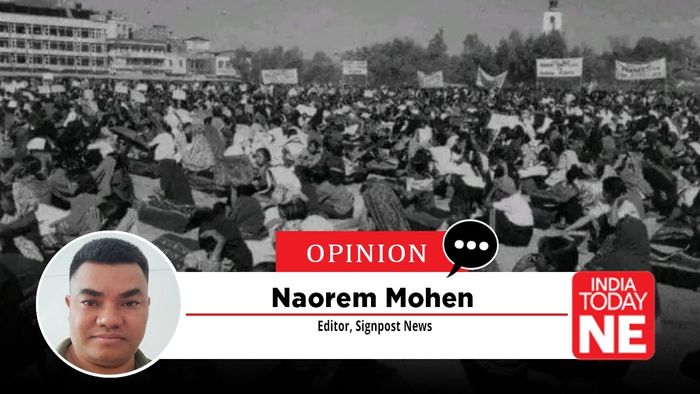How Kukis Forced a Churachandpur School Teacher's Apology in Manipur
Mang Zou was not wrong to address the Kuki community’s historical clashes with other groups, yet he was unjustly forced to apologize by school authorities under intense pressure.

- Oct 13, 2025,
- Updated Oct 13, 2025, 12:18 PM IST
Mang Zou was not wrong to address the Kuki community’s historical clashes with other groups, yet he was unjustly forced to apologize by school authorities under intense pressure.
According to reports, Zou, a dedicated history teacher at Don Bosco School in Churachandpur, challenged the myth of the "Anglo-Kuki War" during a Class XII lecture, making pointed references to the history of Songpi that some deemed disparaging.
Several students claimed Mang Zou singled out Kuki pupils, labeling their community “problematic” and asserting they had “fought against everyone—the British, the Zomis, and the Meiteis, yet won no battle.” He reportedly used mocking local expressions like “Tahchapa/Tahchanu” to highlight his point. This honest reckoning with history, far from being an act of malice, was an attempt to enlighten students with unvarnished facts.
However, the backlash from the Kuki community transformed this educational moment into a coerced confession, exposing a deeper agenda to suppress truth and enforce a fabricated narrative in a town where Kukis have recently seized control from the Paites.This incident, unfolding on October 10, 2025, is no isolated classroom spat—it’s a microcosm of how the Kuki community wields historical revisionism to consolidate power in Churachandpur.
The "Anglo-Kuki War," celebrated since 2017 as a heroic anti-British stand, lacks foundation in colonial records. The UK National Archives and a 1920 report by Assam’s Chief Commissioner describe it as the "Kuki Rebellion" or "Kuki Rising"—a series of localized skirmishes over wartime labor drafts, not a unified war. Historian Robert Reid’s 1942 account notes its suppression via punitive expeditions, with no mention of a "war."
Consider the term “Tahchapa/Tahchanu,” which Mang Zou wielded as a satirical jab. Originally a Kuki expression, it has morphed into a humorous tagline within their community, applied to anyone—even the drunkard who lost his way and stumbled home two or three days ago, as seen in places like Kangpokpi.
Also Read: Why BJP Preserves One Monument but Erases 2000-Year Legacy of Manipur
A striking example unfolded in October 2023 amid Manipur’s ethnic violence: Satkhothang Kipgen, 49, from Kangpokpi district, went missing on September 30 after a night of heavy drinking. The Kuki Students' Organization's media cell swiftly honored him as a “fallen hero” who died “in defence of our ancestral land and freedom,” circulating posters with salutes and tributes.
In a miraculous turn, Kipgen returned alive on October 3, found by police along a national highway near Lonjang village, admitting he had simply gotten lost and rested in a hut. Such glorification of mishaps as heroic sacrifices underscores how the Kuki narrative clings to myth, turning every misstep into a saga of valor—which Mang Zou’s lecture sought to puncture with historical clarity.
Moreover, Mang Zou’s assertion that the Kuki community has a history of fighting against every group finds support in recent decades. The Kukis have, over the past few decades, often got themselves into armed conflicts with other ethnic groups of the region like the Nagas, Paites, Karbis, Dimasas, and Meiteis. These clashes—ranging from the 1992-1997 Naga-Kuki violence to the 1997-1998 Kuki-Paite conflict and tensions with Meiteis in 2023—expose a pattern of inter-ethnic strife, lending weight to Mang Zou’s classroom observations and highlighting the factual basis of his teaching approach.
His lecture threatened this constructed legacy. His candid assessment, amplified by an apology viral video, sparked outrage, with complaints branding his remarks “racial” and demanding his dismissal from the school’s Father. Yet, as a Zou community member linked to the Paite under the Zo umbrella, Mang Zou’s intent was educational, not divisive.
The Kuki response, echoed on social media. The school’s capitulation came swiftly: on October 12, 2025, school authorities visited the Haokip Students’ Organisation (GHQ) office, presenting tea, milk, sugar, and leaves as a tribal apology gesture (“sutlai selpi”).
The Memorandum of Understanding (MoU) that followed expressed the school’s “sincere regret,” pledged to prevent similar incidents, and mandated a feast within two days to symbolize “peace, forgiveness, and closure,” with further discussion deemed “null and void.”
This was a gag order, not a resolution, imposed by Kuki pressure to shield their narrative.The context lies in Churachandpur’s recent power shift. Once a Paite stronghold, the town’s demographics changed in the 1990s. The Naga-Kuki clashes, displaced Kukis from northern hills like Ukhrul and Senapati, pushing them southward. Moreh saw Kuki numbers rise as Nagas retreated.
The Kuki-Paite clash—sparked by a Kuki National Front massacre of 10 Paites in Saikul over taxation—killed 352, injured 136, and displaced 15,000, allowing Kukis, backed by armed groups, to seize Churachandpur town. The 2011 census shows Kukis now outnumbering Paites in the district.
Mang Zou’s facts challenged this new order. The MoU’s feast—served by October 14, 2025—was a ritual of submission, mirroring Kuki tactics like the "war" myth, reinforced by Anglo Kuki War monoliths, fueling “Greater Kukiland” demands. Civil society organization like Kuki Inpi Manipur and Student bodies like KSO enforce this narrative, risking teachers’ careers to uphold it.
Mang Zou’s history class, a bold attempt to expose the lies woven into the fabricated "Anglo-Kuki War" narrative, has instead revealed the precarious state of truth in Churachandpur, a land now occupied by Kuki dominance. The subsequent pressure from Kuki bodies to force an apology on social media highlights a troubling pattern where voices like Mang Zou’s often shift narratives under duress, compromising integrity for political ambitions of few power hungry leaders.
This silencing of educators transforms classrooms into propaganda hubs, eroding the unity essential for Manipur’s future. Yet, hope lingers amid the shadows. Mang Zou’s reluctant apology carries a whisper of defiance, and in Paite and Meitei circles, he is quietly honored as a truth-teller, a beacon that could inspire a return to factual discourse if nurtured with courage.